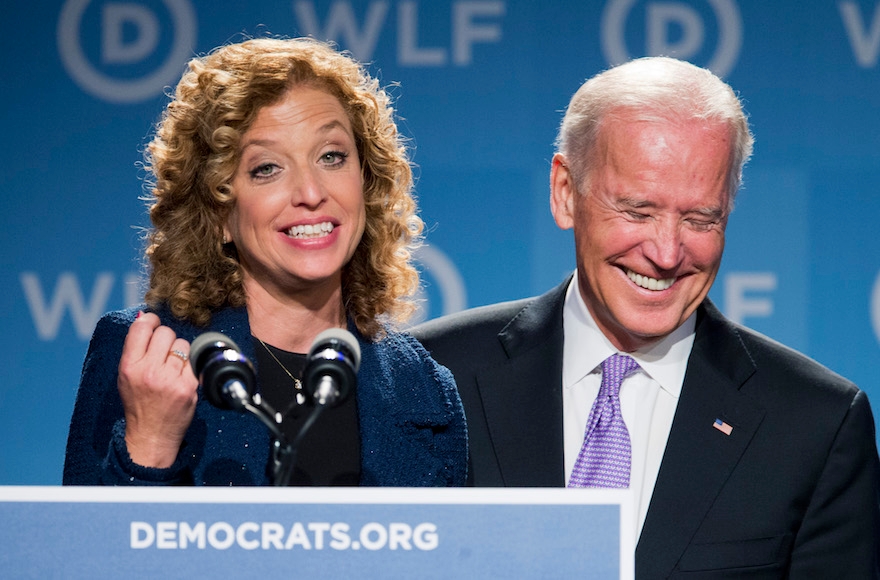The N.Y. Times is wrong to equate Judaism with Iran deal opposition
Published September 10, 2015

Vice President Joe Biden, right, laughing as he is introduced by DNC Chair Rep. Debbie Wasserman Schultz, D-Fla., at the DNC Women’s Leadership conference in Washington, Sept. 19, 2014. (Manuel Balce Ceneta/AP Images)
In a new chart of lawmakers who are against the Iran deal, The New York Times singles out Judaism as a cause of opposition to the nuclear agreement.
The chart, posted Thursday, includes a column with the heading “Jewish?” “Yeses” are highlighted in yellow (yellow!), while “noes” are not.
Another column shows the estimated Jewish populations in the lawmakers’ districts. Districts with a ratio above the United States average of 2.2 percent Jewish also get the yellow treatment.
In the introduction to the chart, titled “Lawmakers against the Iran deal,” the Times quickly dispenses with the germane fact that more Jewish lawmakers than not back the deal.
“Though more Jewish members of Congress support the deal than oppose it, the Democrats against the deal are more likely to be Jewish or represent Jewish constituencies,” Alicia Parlapiano writes.
(UPDATE: The times amended the chart to remove the “Jewish?” column, but introduced an error: “Though more Jewish members of Congress support the deal than oppose it, of the 23 Democrats against the deal, 15 are Jewish,” it now says. Only eight of the Democrats opposing are Jewish.)
The yellow highlighting of the Jewishness of lawmakers and their constituencies — indeed the whole chart — screams “disproportionate influence.”
At JTA, we would be the last to argue that a lawmaker being Jewish is not germane. The Jewish angle drives our political coverage. But if being Jewish matters, it matters as much whichever way you vote.
Prior to coming out in support of the Iran deal, Rep. Jerry Nadler, D-N.Y., said the decision “weighs heavily on all members of Congress — particularly on Jewish members.”
Rep. Debbie Wasserman Schultz, D-Fla., called her decision to back the deal “deeply personal” and said, choking back tears, that she decided as a “Jewish mother.”
Rep. Alan Grayson, D-Fla., signed off on his statement backing the deal with a proverb in Yiddish and then in English: A bad peace is better than a good war.
Each of these lawmakers is Jewish, each represents a district with a substantial Jewish population and each alluded to or directly cited Jewishness in explaining why he or she supports the Iran deal.
You’d know that reading JTA, where I’ve been keeping a tally, and in our coverage of the deal. In the Times, not so much.
What fascinates me about my beat is the rich tapestry of Jewish experience that informs Jewish political life. Deal opponent Chuck Schumer’s self-appointed role as a guardian of Israel matters just as much as deal supporter Wasserman Schultz’s considerations of Iranian anti-Semitism.
The Times chart — well, holistic it ain’t. In fact, it looks more like an indictment.
What gives?
This entry passed through the Full-Text RSS service – if this is your content and you’re reading it on someone else’s site, please read the FAQ at fivefilters.org/content-only/faq.php#publishers.














